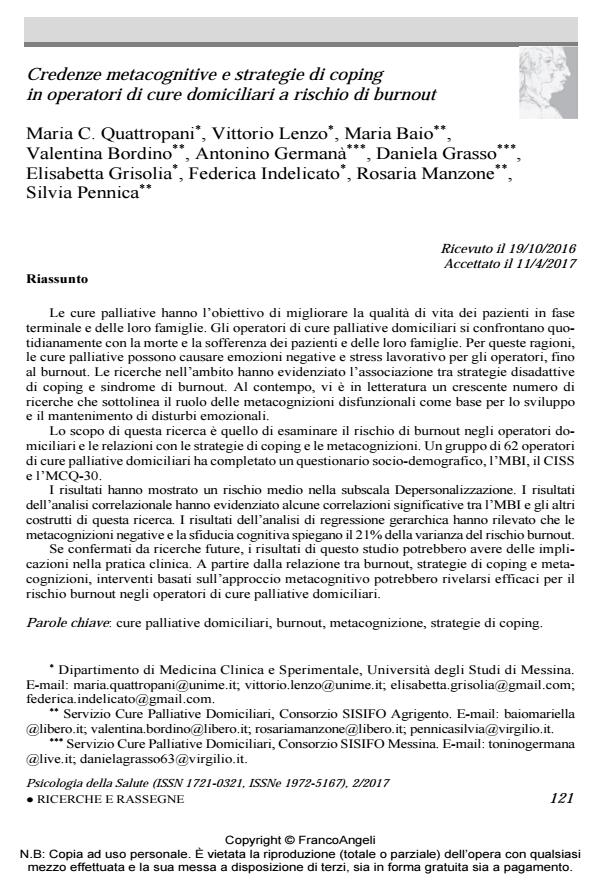Credenze metacognitive e strategie di coping in operatori di cure domiciliari a rischio di burnout
Titolo Rivista PSICOLOGIA DELLA SALUTE
Autori/Curatori Maria C. Quattropani, Vittorio Lenzo, Maria Baio, Valentina Bordino, Antonino Germanà, Daniela Grasso, Elisabetta Grisolia, Federica Indelicato, Rosaria Manzone, Silvia Pennica
Anno di pubblicazione 2017 Fascicolo 2017/2
Lingua Italiano Numero pagine 22 P. 121-142 Dimensione file 274 KB
DOI 10.3280/PDS2017-002006
Il DOI è il codice a barre della proprietà intellettuale: per saperne di più
clicca qui
Qui sotto puoi vedere in anteprima la prima pagina di questo articolo.
Se questo articolo ti interessa, lo puoi acquistare (e scaricare in formato pdf) seguendo le facili indicazioni per acquistare il download credit. Acquista Download Credits per scaricare questo Articolo in formato PDF

FrancoAngeli è membro della Publishers International Linking Association, Inc (PILA), associazione indipendente e non profit per facilitare (attraverso i servizi tecnologici implementati da CrossRef.org) l’accesso degli studiosi ai contenuti digitali nelle pubblicazioni professionali e scientifiche.
Le cure palliative hanno l’obiettivo di migliorare la qualità di vita dei pazienti in fase terminale e delle loro famiglie. Gli operatori di cure palliative domiciliari si confrontano quotidianamente con la morte e la sofferenza dei pazienti e delle loro famiglie. Per queste ragioni, le cure palliative possono causare emozioni negative e stress lavorativo per gli operatori, fino al burnout. Le ricerche nell’ambito hanno evidenziato l’associazione tra strategie disadattive di coping e sindrome di burnout. Al contempo, vi è in letteratura un crescente numero di ricerche che sottolinea il ruolo delle metacognizioni disfunzionali come base per lo sviluppo e il mantenimento di disturbi emozionali. Lo scopo di questa ricerca è quello di esaminare il rischio di burnout negli operatori domiciliari e le relazioni con le strategie di coping e le metacognizioni. Un gruppo di 62 operatori di cure palliative domiciliari ha completato un questionario socio-demografico, l’MBI, il CISS e l’MCQ-30. I risultati hanno mostrato un rischio medio nella subscala Depersonalizzazione. I risultati dell’analisi correlazionale hanno evidenziato alcune correlazioni significative tra l’MBI e gli altri costrutti di questa ricerca. I risultati dell’analisi di regressione gerarchica hanno rilevato che le metacognizioni negative e la sfiducia cognitiva spiegano il 21% della varianza del rischio burnout. Se confermati da ricerche future, i risultati di questo studio potrebbero avere delle implicazioni nella pratica clinica. A partire dalla relazione tra burnout, strategie di coping e meta-cognizioni, interventi basati sull’approccio metacognitivo potrebbero rivelarsi efficaci per il rischio burnout negli operatori di cure palliative domiciliari.
Parole chiave:Cure palliative domiciliari, burnout, metacognizione, strategie di coping.
- Handbook of Research on Healthcare Standards, Policies, and Reform Vittorio Lenzo, Alberto Sardella, Maria C. Quattropani, pp.108 (ISBN:9781799888680)
- A Systematic Review of Metacognitive Beliefs in Chronic Medical Conditions Vittorio Lenzo, Alberto Sardella, Gabriella Martino, Maria C. Quattropani, in Frontiers in Psychology 2875/2020
DOI: 10.3389/fpsyg.2019.02875 - Stress, Burnout, and Resilience among Healthcare Workers during the COVID-19 Emergency: The Role of Defense Mechanisms Mariagrazia Di Giuseppe, Gianni Nepa, Tracy A. Prout, Fabrizio Albertini, Stefano Marcelli, Graziella Orrù, Ciro Conversano, in International Journal of Environmental Research and Public Health /2021 pp.5258
DOI: 10.3390/ijerph18105258 - Changes of narrative meaning-making markers
during the different phases of breast cancer
treatment for women below 50 years old Maria Luisa Martino, Daniela Lemmo, Anna Gargiulo, Daniela Barberio, Valentina Abate, Franca Avino, Maria Francesca Freda, in Health Psychology Report /2021 pp.58
DOI: 10.5114/hpr.2021.105363 - Longitudinal associations of depression, anxiety, and stress among healthcare workers assisting patients with end-stage cancer during the COVID-19 pandemic: the moderator role of emotional exhaustion Alberto Sardella, Alessandro Musetti, Christian Franceschini, Maria C. Quattropani, Vittorio Lenzo, in BMC Psychology 359/2024
DOI: 10.1186/s40359-024-01851-1 - Exploring emotions in dialog between health provider, parent and child. An observational study in pediatric primary care Francesca Dicé, Pasquale Dolce, Assunta Maiello, Maria Francesca Freda, in Pratiques Psychologiques /2020 pp.69
DOI: 10.1016/j.prps.2018.12.001 - Risk of burnout in a sample of oncology healthcare professionals working in a hospital oncology unit with hospice and relationship with dysfunctional metacognitive beliefs Vittorio Lenzo, Giuliana Maisano, Claudia Garipoli, Marcello Aragona, Antonella Filastro, Valeria Verrastro, Maria C. Petralia, Maria C. Quattropani, in Minerva Psichiatrica /2020
DOI: 10.23736/S0391-1772.19.02033-8 - Gli Interventi Assistiti dagli Animali come processi di promozione della salute. Una review sistematica Francesca Dicé, Antonio Santaniello, Federica Gerardi, Alda Paoletti, Paolo Valerio, Maria Francesca Freda, Lucia Francesca Menna, in PSICOLOGIA DELLA SALUTE 3/2018 pp.5
DOI: 10.3280/PDS2018-003001 - Dispositional Optimism and Context Sensitivity: Psychological Contributors to Frailty Status Among Elderly Outpatients Alberto Sardella, Vittorio Lenzo, George A. Bonanno, Gabriella Martino, Giorgio Basile, Maria C. Quattropani, in Frontiers in Psychology 621013/2021
DOI: 10.3389/fpsyg.2020.621013 - The interplay between burnout risk and attachment styles among palliative care practitioners Vittorio Lenzo, Alberto Sardella, Giuliana Maisano Branca, Valentina Bordino, Marcello Aragona, Claudia Garipoli, Adriano Schimmenti, Maria Catena Quattropani, in Psychodynamic Practice /2021 pp.1
DOI: 10.1080/14753634.2021.1922305
Maria C. Quattropani, Vittorio Lenzo, Maria Baio, Valentina Bordino, Antonino Germanà, Daniela Grasso, Elisabetta Grisolia, Federica Indelicato, Rosaria Manzone, Silvia Pennica, Credenze metacognitive e strategie di coping in operatori di cure domiciliari a rischio di burnout in "PSICOLOGIA DELLA SALUTE" 2/2017, pp 121-142, DOI: 10.3280/PDS2017-002006